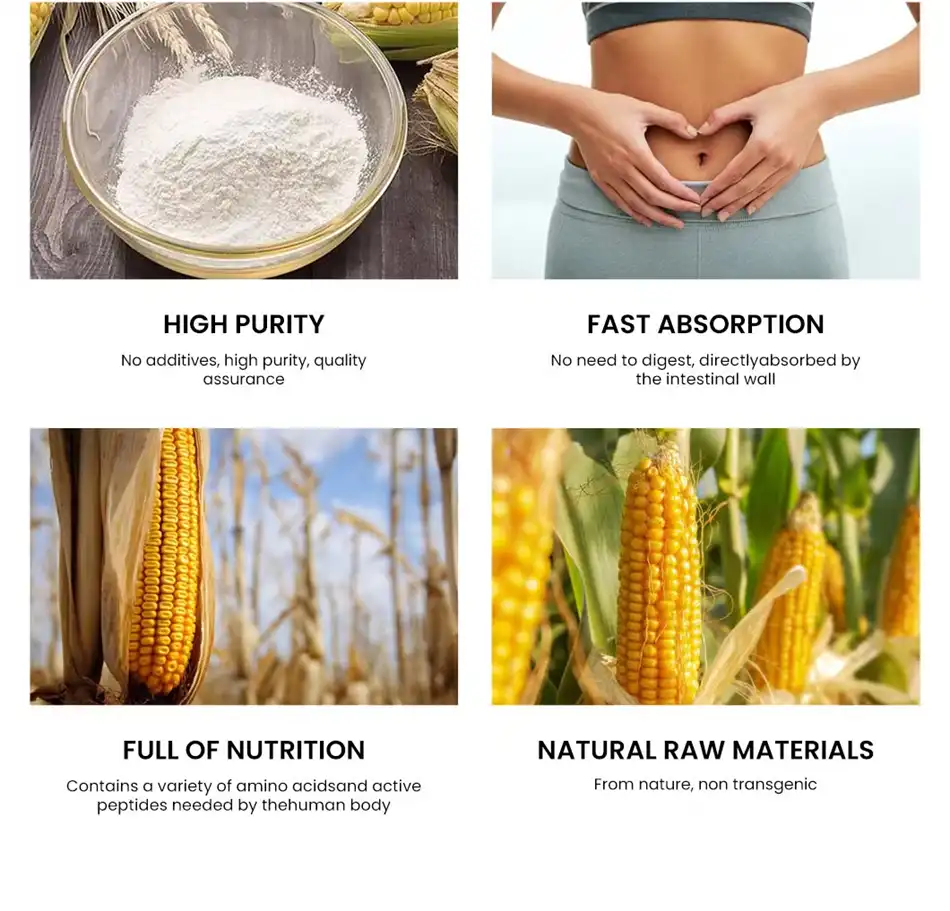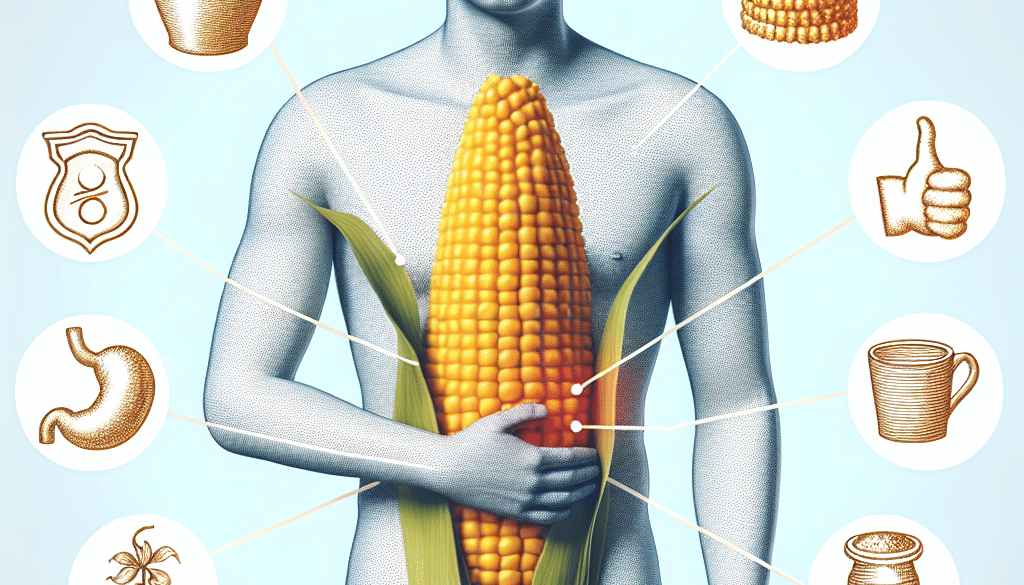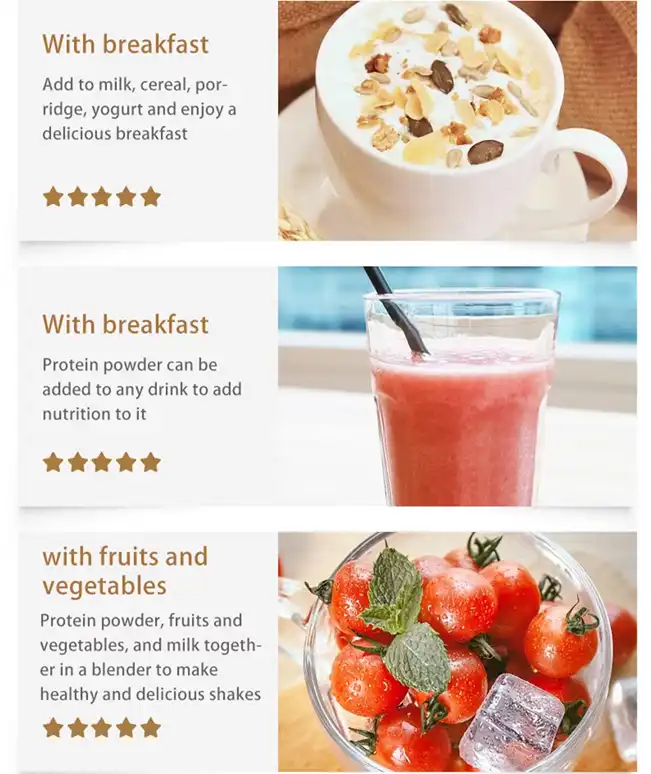Hydrolyzed Corn Protein: The Plant-Based Protein Powerhouse for Health and Wellness
In today’s world, where health and wellness trends are rapidly evolving, people are looking for natural, clean, and effective ingredients to support their lifestyles. Hydrolyzed corn protein is one such ingredient making waves. Derived from corn and meticulously processed to optimize its benefits, hydrolyzed corn protein offers a versatile and sustainable alternative for those seeking plant-based, allergen-free protein sources. In this post, we’ll uncover what makes hydrolyzed corn protein so unique, its potential benefits, and how it fits seamlessly into a wellness-centered life.
What is Hydrolyzed Corn Protein?
Hydrolyzed corn protein is created by breaking down corn proteins into smaller peptide chains through a process called hydrolysis. This approach allows for easier digestion and greater bioavailability, meaning your body can readily absorb and utilize the protein. The result is a high-quality, plant-based protein with a rich amino acid profile that is valuable for a variety of health applications.

How to make Hydrolyzed Corn Protein?
The manufacturing process is hydrolysis maize protein by acid, enzyme or alkali. Generally, the acid method is the main process utilized. Hydrochloric acid is added to the plant protein to hydrolyze it. After neutralization, it is decolorized, deodorized, filtered and concentrated to form a slurry or make it a powered form through the spray-dried method.
EFSA also mentioned a brief production process through acid hydrolysis. Manufacturing includes acid hydrolysis (6-8 hours, temperature 110-140oC, maximum pressure 4 bar), neutralization, filtration and ripening.
What Sets Hydrolyzed Corn Protein Apart?
Hydrolyzed corn protein stands out for its purity, fast absorption, nutritional value, and sustainable raw materials. The hydrolysis process breaks the protein into smaller peptides, ensuring quick and efficient absorption by the body or skin. This makes it ideal for applications in skincare, haircare, and nutrition, where rapid effectiveness is essential.
Purity: Gentle on skin and suitable for sensitive or allergen-conscious consumers.
Fast Absorption: The hydrolysis process breaks proteins into smaller peptides, ensuring quick and efficient absorption for maximum effectiveness.
Nutritional Value: Packed with essential amino acids, it provides significant health and beauty benefits.
Sustainable Raw Materials: Derived from renewable corn resources, often utilizing byproducts to promote sustainability and reduce waste.

Key Health Benefits of Hydrolyzed Corn Protein
1. Easy Digestibility and Rapid Absorption: Unlike many protein sources that may cause digestive discomfort, hydrolyzed corn protein is already partially broken down, making it incredibly easy on the stomach and quick to absorb. This characteristic makes it ideal for athletes, active individuals, and anyone seeking efficient protein sources for muscle repair and recovery.
2. Amino Acid Richness for Muscle Building and Repair: Hydrolyzed corn protein is loaded with essential amino acids like leucine, which is vital for muscle synthesis, as well as valine, isoleucine, and other amino acids that are crucial for overall body repair. These amino acids support muscle growth, making hydrolyzed corn protein an excellent choice for fitness enthusiasts looking to maintain muscle mass and accelerate recovery times.
3. A Vegan, Allergen-Free Protein Solution: For those with allergies to dairy, soy, or gluten, or for anyone committed to a plant-based diet, hydrolyzed corn protein offers a safe and sustainable alternative. Free from common allergens, it’s perfect for those who want to avoid animal-based proteins without compromising on quality. Hydrolyzed corn protein provides clean, plant-powered nutrition in an increasingly allergen-conscious world.
4. Beauty Benefits: Hair and Skin Health: The benefits of hydrolyzed corn protein extend beyond muscles; it also plays a significant role in hair and skin health. The peptides in hydrolyzed corn protein help strengthen hair fibers, reduce breakage, and improve overall hair resilience. The amino acids also nourish the skin, providing essential building blocks for skin cells, resulting in a more youthful and hydrated appearance.
5. A Sustainable, Eco-Friendly Protein Choice: Choosing hydrolyzed corn protein over animal-based proteins helps reduce your carbon footprint. As a crop, corn requires fewer resources compared to animal farming, and its protein extraction process is designed to be eco-friendly. By integrating hydrolyzed corn protein into your routine, you’re supporting a more sustainable approach to nutrition without sacrificing protein quality or effectiveness.

Hydrolyzed Corn Protein in Cosmetics: A Hidden Gem for Skin Health
Hydrolyzed corn protein peptides are a breakthrough ingredient in skincare, offering a range of benefits for skin health and rejuvenation. These peptides, derived from corn protein through enzymatic hydrolysis, are composed of small amino acid chains that are easily absorbed by the skin, making them highly effective in cosmetic formulations.
Key Benefits:
Deep Hydration: Hydrolyzed corn protein peptides help retain moisture, ensuring the skin remains soft, plump, and radiant.
Skin Elasticity: By supporting collagen synthesis, they improve skin firmness and reduce the appearance of fine lines and wrinkles.
Barrier Repair: These peptides enhance the skin’s natural barrier, protecting it from environmental stressors and preventing moisture loss.
Gentle on Skin: Suitable for sensitive skin types, hydrolyzed corn protein peptides are non-irritating and ideal for natural skincare products.
Eco-Friendly: As a plant-based, renewable ingredient, they align with sustainable beauty trends.
Incorporating hydrolyzed corn protein peptides into cosmetics offers a natural, effective way to promote healthier, more resilient skin while supporting environmentally conscious practices. This innovative ingredient continues to shape the future of skincare.
Harnessing the Power of Hydrolyzed Corn Protein for Natural Hair Health
Hydrolysed corn protein provides numerous benefits for the hair, and especially for damaged hair. It has been proven to significantly help hair that has been chemically treated, either with a perm or hair dye treatment. This is due to the clear improvement of the traction properties of the hair fibres, particularly when being dried, helping to maintain the hair's elasticity by controlling its loss of humidity. This prevents the hair from breaking, as hydrolysed corn protein is capable of influencing the hair’s mechanical properties due to its capacity to penetrate into the cortex. What’s more, the more the hair has been damaged, the easier it is to penetrate.
Likewise, hydrolysed corn protein makes hair easier to comb, giving it a soft and silky feel and fully moisturising the hair from root to tip, helping maintain its natural structure. Although damage caused to the keratin cannot be repaired, gaps in the hair can be infused with cysteine, thus preventing any further weakening of the fibre.
All of these benefits are due to the corn's capacity to strengthen the hair follicles thanks to the antioxidant effect of the Vitamin C, which generates collagen production, keeping the hair moisturised, nourished and making it shine. On the other hand, thanks to its antioxidant action, the corn also prevents cell damage by trapping free radicals, thus preventing premature ageing, dryness and hair loss.

Why Choose Hydrolyzed Corn Protein Over Traditional Protein Sources?
Traditional protein sources like whey and casein are derived from dairy and may pose challenges for people with lactose intolerance or dairy allergies. Hydrolyzed corn protein offers the benefits of a complete protein source without the risks associated with animal-based proteins. Additionally, it’s minimally processed, which makes it a clean label ingredient ideal for those who prioritize transparency in their nutritional choices.
How to Incorporate Hydrolyzed Corn Protein Into Your Diet?
One of the biggest advantages of hydrolyzed corn protein is its versatility. It has a mild flavor that blends well into a variety of recipes, making it easy to incorporate into your daily routine. Here are a few creative ways to enjoy it:
1. Corn Gluten Meal: Add corn gluten powder to your smoothies, protein shakes or baked goods.
2. Corn Snacks: Look for snacks made from corn, such as cornflakes or popcorn, and enjoy the health benefits of corn peptides while satisfying your cravings.
3. Corn-based meals: Prepare corn-based dishes, such as tortillas, cornbread, or corn salad, to incorporate this healthy ingredient.

Scientific Backing for Hydrolyzed Corn Protein
Research on hydrolyzed proteins shows that they may support faster recovery, reduced muscle soreness, and improved bioavailability compared to non-hydrolyzed proteins. Studies have highlighted that these proteins can deliver rapid amino acid absorption, which is particularly beneficial after physical activity or for those who struggle with digestion. By providing a sustained release of amino acids, hydrolyzed corn protein keeps the body fueled and ready for daily challenges.
Are Corn Protein Peptides Sustainable?
Hydrolyzed corn proteins are a sustainable ingredient, derived from renewable corn and often utilizing byproducts from corn processing, such as corn gluten meal. This approach reduces agricultural waste and maximizes resource efficiency, making these proteins an eco-conscious choice. Their production has a significantly smaller environmental footprint than animal-based proteins, requiring less water, energy, and land, and contributing to lower greenhouse gas emissions.
Additionally, hydrolyzed corn proteins align with the principles of a circular economy by transforming byproducts into valuable components for industries like cosmetics, food, and health products. This reduces reliance on virgin resources and minimizes waste while catering to the growing demand for plant-based, sustainable solutions.
Hydrolyzed corn proteins offer a promising alternative for industries looking to balance functionality with environmental responsibility, provided that improvements in farming methods continue to address their broader ecological impact.

A Plant-Based Protein that Delivers the Best Quality
Hydrolyzed corn protein has cemented its place in the wellness industry for good reason. Not only does it provide an impressive array of benefits for both active and health-conscious individuals, but it also aligns with sustainable, environmentally friendly values. For those seeking a high-quality protein that meets the demands of modern, mindful living, hydrolyzed corn protein is an ideal choice.

Is Hydrolyzed Corn Protein Right for You?
Whether you’re an athlete, a beauty enthusiast, or someone looking for a clean, plant-based protein source, hydrolyzed corn protein offers advantages that traditional proteins may not. Its digestibility, nutrient density, and versatility make it a valuable addition to any balanced lifestyle. With a growing demand for natural, effective ingredients, hydrolyzed corn protein stands out as a powerful tool for health, beauty, and wellness.
Where to Buy Hydrolyzed Corn Protein?
Discover the exceptional quality of Hydrolyzed Corn Protein from YANGGE BIOTECH INGREDIENTS, available with a complimentary sample at yanggebiotech.com. Renowned as an industry leader, YANGGE BIOTECH is dedicated to manufacturing and distributing premium-grade dietary supplement ingredients, delivering purity and potency with every product.
Not only does YANGGE BIOTECH serve health-conscious consumers directly, but it also partners with top brands across the food and supplement sectors, supplying raw, pure ingredients that meet the highest industry standards. Elevate your product offerings or personal wellness with our trusted ingredients—reach out to us today to place your order and experience the YANGGE difference.
To sum up, Hydrolyzed Corn Protein are a versatile and sustainable ingredient with applications that extend beyond nutrition. In cosmetics, they offer hydration, skin repair, and protection against environmental stressors, making them a valuable addition to modern skincare formulations. Their benefits also support broader wellness goals, including muscle recovery and heart health, while aligning with the demand for plant-based, eco-friendly solutions. Whether in food, cosmetics, or functional products, corn protein peptides are proving to be a multifaceted powerhouse for health and sustainability.
Why Choose Yangge Biotech for Hydrolyzed Corn Protein?
Yangge Biotech is your trusted source for premium Hydrolyzed Corn Protein. Here’s why:
Top-Quality Products: Yangge Biotech ensures the highest standards of purity and color consistency, meeting global regulatory standards for food, cosmetics, and textiles.
Sustainable and Ethical: The company is committed to eco-friendly sourcing and responsible agricultural practices, making it the go-to choice for businesses seeking a natural, sustainable colorant.
Customization: Whether you need powder, liquid, or concentrated forms, Yangge offers flexible solutions tailored to your needs.
Certified and Reliable: With certifications like GMP, ISO, and Kosher, you can trust the safety and quality of every batch of Carthamus Red.
Global Reach, Excellent Service: With a strong global presence and exceptional customer support, Yangge Biotech ensures a smooth, hassle-free experience from start to finish.
Discover the vibrant power of Hydrolyzed Corn Protein with Yangge Biotech – where top-notch quality, sustainability, and a customer-first approach come together to elevate your experience!
References
Koo SH, Bae IY, Lee S, Lee DH, Hur BS, Lee HG. Evaluation of wheat gluten hydrolysates as taste-active compounds with antioxidant activity. J Food Sci Technol. 2014; 51(3):535-542.
Aaslyng MD, Martens M, Poll L, Nielsen PM, Flyge H, Larsen LM. Chemical and sensory characterization of hydrolyzed vegetable protein, a savory flavoring. J Agric Food Chem. 1998; 46(2):481-489.
Freeman M. Reconsidering the effects of monosodium glutamate: a literature review. J Am Acad Nurse Pract. 2006; 18(10):482-486.
Zanfirescu A, Unguriana A, Tsatsakis AM, et al. A review of the alleged health hazards of monosodium glutamate. Compr Rev Food Sci Food Saf. 2019; 18(4):1111-1134.
Scopp AL. MSG and hydrolyzed vegetable protein induced headaches: review and case studies. Headache. 1991; 31(2):107-10.
Fernstrom JD. Monosodium glutamate in the diet does not raise brain glutamate concentrations or disrupt brain functions. Ann Nutr Metab. 2018; 73(5):43-52.
Obayashi Y, Nagamura Y. Does monosodium glutamate really cause headache? A systematic review of human studies. J Headache Pain. 2016; 17:54.
CFR – Code of Federal Regulations Title 21: 21CFR102. https://www.accessdata.fda.gov/scripts/cdrh/cfdocs/cfcfr/CFRSearch.cfm?CFRPart=102&showFR=1&subpartNode=21:2.0.1.1.3.2
Hydrolyzed vegetable protein market – Growth, trends, and forecasts (2020-2025). Mordor Intelligence website. https://www.mordorintelligence.com/industry-reports/hydrolyzed-vegetable-protein-market. Accessed April 15, 2020.

